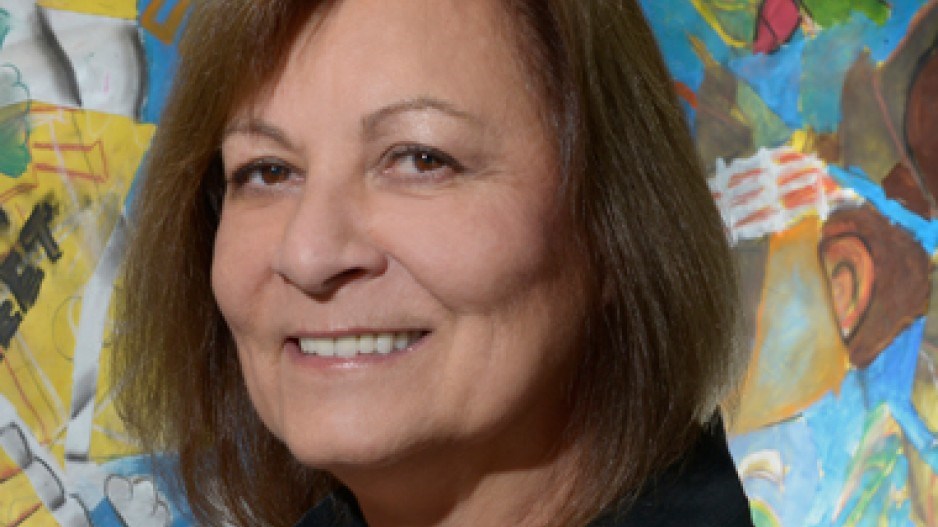Lucille Pacey has two passions: the arts, and education.
As CEO of Arts Umbrella, she combines the two in a way the former textile designer and later vice-president of the Open Learning Agency never expected.
"I had never seen myself working in a children-oriented organization," said Pacey. "I had worked in education my entire career, but at the post-secondary level."
In fact, a recruiter had to convince Pacey the job would be a good fit for her. She didn't know much about the not-for-profit arts organization, which has offered high-quality art classes for children and youth from its Granville Island location since 1983.
But since taking the job in 2004, Pacey has discovered the joy of the work — and the huge potential for growth. "I think it's a privilege … to be able to see what these children do and the passion that they have and to be able to see them on a day-to-day basis," she said.
Since becoming CEO, Pacey has pushed the non-profit to go beyond the cozy confines of Granville Island. With the board of directors, she led a new strategic plan for the organization, with an emphasis on reaching out.
Of the 22,000 children and young people Arts Umbrella serves each year, 14,000 are able to take advantage of scholarships and bursaries to pay for the cost of the programs.
"As we grew our outreach programming, we wanted to be with children who were more disadvantaged and we wanted to be with them for longer periods of time," Pacey said.
Arts Umbrella worked with the University of British Columbia to determine where the need was greatest. Three geographic areas were identified: Burnaby, Chilliwack and Surrey.
The organization decided to open a satellite location in Surrey. The City of Surrey, which has written policies about child and family development as well as the arts, welcomed Arts Umbrella with open arms, Pacey said.
"She's really looking outside of the usual business practice and identified to enhance the brand and enhance the business model," said Jamie Pitblado, a board member of Arts Umbrella and the general manager of Grey Cup 2014 for the BC Lions.
"She's really needed to do a lot of the heavy lifting in that regard."
Pacey's first exposure to teaching came when she was 15 and got a job teaching women to sew in the small town of Smoky Lake, Alberta.
She earned a bachelor of science from the University of Alberta, where she studied textile design.Later, she got a master's in educational administration.
Leadership is something that has always come naturally.
"I've always seen myself as a builder, so I've always found myself in positions of authority, and I've always felt comfortable in those positions," she said.
Pacey is now focused on navigating a changing fundraising landscape. The organization is looking at the number and effectiveness of the fundraising events it holds each year, and also how to work with foundations in an era when online applications are replacing one-on-one relationships with funders.
"Like any other organization — big business, small business, medium-sized business — we are always faced with the challenge of reinventing ourselves and making sure we're relevant to our community," she said. "That's a big job for a not-for-profit." •
Q&A
What sorts of character traits or leadership styles do CEOs have to cultivate in the 21st century?
Ability to be nimble, take risks and communicate clearly and frequently.
What accomplishments are you most proud of?
Building an international reputation for the Open Learning Agency; launching the World Education Market in Vancouver; and learning how to adapt to different circumstances and situations.
What is the biggest challenge you have faced?
Cultivating the needs and interests of an artistic not-for-profit charity while at the same time leading a sustainable business; the expectations of a successful charity should be no different than those of a successful business.
What career decisions would you make differently were you starting out today?
None. I was lucky to be part of a generation where we could follow our heart and be confident in finding rewarding and interesting employment; if anything perhaps owning my own business would have been a consideration, but I was always fully engaged in my work and therefore did not feel compelled to build my own business.
What's one business lesson that you'd like to pass on to others?
Hire people who are competent and smarter than you. Don't be afraid to fail — lessons always follow.
What sorts of character traits or leadership styles do CEOs have to cultivate in the 21st century?
Ability to be nimble, take risks and communicate clearly and frequently.
What accomplishments are you most proud of?
Building an international reputation for the Open Learning Agency; launching the World Education Market in Vancouver; and learning how to adapt to different circumstances and situations.
What is the biggest challenge you have faced?
Cultivating the needs and interests of an artistic not-for-profit charity while at the same time leading a sustainable business; the expectations of a successful charity should be no different than those of a successful business.
What career decisions would you make differently were you starting out today?
None. I was lucky to be part of a generation where we could follow our heart and be confident in finding rewarding and interesting employment; if anything perhaps owning my own business would have been a consideration, but I was always fully engaged in my work and therefore did not feel compelled to build my own business.
What's one business lesson that you'd like to pass on to others?
Hire people who are competent and smarter than you. Don't be afraid to fail — lessons always follow.




